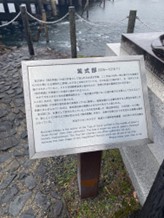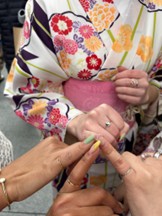When in Tokyo…Learn Japanese
February 14, 2025
Everyone will tell you that studying abroad changes your perspective on life and the world on a larger scale, it’s a cliche, but they are so right. In Japan, I made lifelong friends, connections, and enough memories to power my will to live forever. Make sure you squeeze every opportunity you can out of it, it’ll be over before you can process ever being there.

Hiking to the best view of Mt. Fuji!
One massive regret I have is not practicing Japanese more while in Tokyo. I have a million excuses: “I attended an international school that taught in English”, “sometimes when I spoke, they’d speak English back”, and most of the time it was that native speakers saw an opportunity to practice their English with me. All these excuses are just that – excuses. It doesn’t matter where you’re going, you’ll likely never be that immersed in the language again. This is a learning opportunity you can’t miss. Use the language as much as you can. Teach your friends, use it even with international groups, and ask native speakers to practice the language with you.

Sometimes the English will be readily available to you, but trying to read first and being able to check your comprehension is a good learning tool.
Temple University Japan is an international school, meaning classes were taught in English and there were students from all around the globe. As a native English speaker, this was an easy and comfortable environment to “forget” to practice Japanese. Nine times out of ten the other students were also learning Japanese or were Japanese native speakers. There’s really no reason not to incorporate a little Japanese in your downtime with classmates.
A big part of being in Japan, specifically, is the expectation to speak Japanese everywhere. Don’t let this discourage you from going if you don’t yet know any Japanese! There are survival phrases you can learn for any country you go to and fortunately we have translation technology. Still, if you speak to someone in a service context and they speak English back to you, do not freak out and get self-conscious about your speaking. Likely, they are trying to expedite the service for your benefit or attempting to practice English themselves. If you’re at a McDonald’s, just speak as best you can, if they choose to speak English to you let it be and don’t take it personally. Always start a conversation or transaction in the language you’re learning if you truly intend to get better and learn more.

My friends and I got our nails done every month during our trip. Every time I’d talk to the nail artist because it was a comfortable space for basic conversation, I got to know her pretty well by my last appointment.
Once, a friend asked to speak with me in Japanese for the rest of the night. They spoke English fluently though, which for some reason made me too embarrassed to speak in front of them. I turned the offer down, worried they’d think less of me if I demonstrated my actual comprehension of the language. Of course, they wouldn’t have judged me harshly, but I was too cowardly to even try. If you can’t produce a perfect sentence that’s okay! Friends are forgiving and if they’re asking to speak with you in their language, it’s an open invitation to learn from an expert. Be brave and just try your best! If you ask them to correct you before you start it’ll be less embarrassing when they do. It’ll also make them feel more comfortable knowing you want to be corrected. They’ll be appreciative you’re learning the language and that you’re making the effort to speak it with them.

Being more comfortable speaking helped me take this solo trip to Hiroshima! While there, I met a local who showed me around their hometown and pointed out landmarks I should go to.
The difference between those of us who practiced Japanese at every opportunity and those of us that didn’t is crazy. Now, continuing my language classes, I am behind the same peers I used to take entry level classes with. They can use slang appropriate for our age group, have a better understanding of honorific speech, and likely made more Japanese speaking friends. While I was there, I still learned so much more than I would have in a classroom back at Chapman. It wasn’t like I never spoke and never practiced, I had several great conversations with some native speakers and maintain some connections where I can still text them and practice Japanese, but I could’ve become more fluent if I’d tried to. Exchanging those learning opportunities for mere comfort in the moment was not worth it long term.
Talking takes a lot of courage; the biggest hurdle is self-confidence. Don’t be afraid to make mistakes! Still if you’re not feeling ready, you can improve language skills by: reading everything and trying to understand it, watch local TV (especially the news), listening to conversations and investing in them, intentionally research your interests and how to describe them in the desired language, and of course language learning apps and classes are always available.
Mistakes will happen, it’s okay, just try again!
When you travel to a foreign language country, please make an effort to learn the language (if only out of respect and cultural appreciation), step out of your comfort zone and talk with native speakers (you only stand to benefit), and most importantly, have fun, loosen up and focus on enjoying the whole experience! ^_^
Roslyn Addy,
Psychology B.A.
Temple University
Japan Spring 2024
Tokyo, Japan

